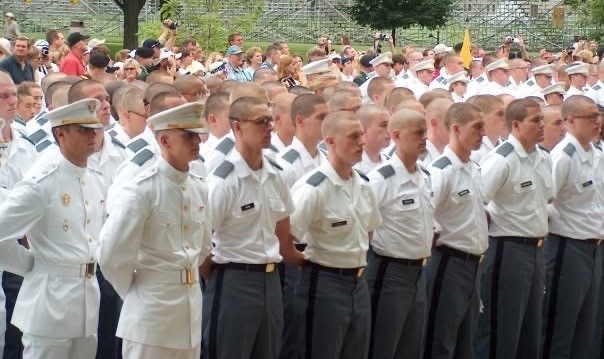This is the second essay in a five-part series. To read the previous piece, see here.
The Knowledge Book
The Cadet Basic Training Knowledge Book is a 58-page paperback volume all New Cadets were expected to memorize cover to cover by the end of Beast. Every week, the cadre had to sign off on a set number of new pages I memorized. The thing was, they could demand I recite any previously memorized passage at any time. Failure to do so would, you guessed it, result in hazing.
I hated this book. But I did like one thing in it: the Cadet Honor Code. “A Cadet will not lie, cheat, steal, or tolerate those who do.” I still like it, which is why I came clean about the conversation I inserted in the first essay’s opener for narrative efficiency and laughs. Schofield’s Definition of Discipline, however, can go fuck itself. Here it is in full:
“The discipline which makes the soldiers of a free country reliable in battle is not to be gained by harsh or tyrannical treatment. On the contrary, such treatment is far more likely to destroy than to make an army. It is possible to impart instruction and to give commands in such a manner and such a tone of voice to inspire in the soldier no feeling but an intense desire to obey, while the opposite manner and tone of voice cannot fail to excite strong resentment and a desire to disobey. The one mode or the other of dealing with subordinates springs from a corresponding spirit in the breast of the commander. He who feels the respect which is due to others cannot fail to inspire in them regard for himself, while he who feels, and hence manifests, disrespect toward others, especially his inferiors, cannot fail to inspire hatred against himself.”
Major General John M. Schofield
Address to the Corps of Cadets, U.S. Military Academy
August 11, 1879
I still know it by memory. I still hate it, too, mostly because the people who used it to haze me completely ignored its contents.
Hazing
Forget whatever bullshit frat boy version of hazing you have in your head. West Point hazing circa 2005 was a creature completely apart. Its most common form was yelling. I was routinely called a useless, idiotic, disappointment to all my ancestors who just killed my entire platoon by failing to tuck my shoelaces into my boots. The yelling wasn’t too bad once I learned how to dissociate to my Happy Place. This wasn’t a saccharine escapist realm of meadows, rainbows, and anthropomorphic Disney animals, but a more serene state of mind during which verbal abuse bounced off me without making much of an impression.
I couldn’t dissociate completely, though, because yelling was often paired with demands to recite passages from the Knowledge Book and complete pushups or other physical punishments. I was really fucked, however, when three or more cadre berated me at the same time. If I began addressing one, the others would lose their shits because I ignored them. I’d find myself in a weird liminal space between a dozen competing orders, stuck in the interstitial between doing pushups, reciting the Army Fight Song, and counting down the days to the Yearling Winter Weekend.
They covered me in spit while screaming to high heaven just inches from my face. But all things come to an end. I just had to accept it was my turn and take it. Other people couldn’t, though. One guy in my platoon was caught outside his tent past sunset while we were in the field. He was surrounded by four cadre who laid into him like he’d committed bloody murder. Something inside his head broke and he ran screaming into the darkening woods. He quit the next day.
The next most common form of hazing was pushups. I did pushups when I was late. I did pushups when I didn’t properly salute. I did pushups when I dropped my rifle (“Drop with it!”). 20 pushups at a time were about making a statement. At 50 pushups, things were more serious. Past 70 pushups, I really fucked up and now the cadre just wanted me to hit muscle failure and fall on my face.
Pushups were by no means the only physical form of punishment. There were all sorts of fun, inventive ways to make us miserable. Cadre would sometimes switch to flutter kicks to give our arms a break. Indeed, a New Cadet contracted a nasty outbreak of athlete’s back after being forced to do nude flutter kicks in the showers.
Another simple yet horrible exercise was the overhead arm clap. Like it says on the tin, spread your arms perpendicular to your body and clap them repeatedly over your head. Along a similar vein, cherry pickers involved extending both arms to either side, turning your palms upward, and grabbing three invisible cherries while chanting, “Pick! Pick! Pick!” before rotating your wrists down and releasing the ethereal fruit with a corresponding, “Drop! Drop! Drop!” After completing 30 of either exercise, my arms cramped and, shaking with lactic acid, I’d wonder why the Spanish Inquisition didn’t just follow West Point’s lead rather than all the mucking around they did with racks, wheels, and iron maidens.
But the cadre could be much more inventive with their hazing. The monkey fucker entailed squatting on your haunches, grabbing your ankles, and humping the air until the upperclassmen stopped laughing. To correctly complete the star man, you must crouch into a ball before jumping into the air, arms and legs fully extended, while declaring, “I’m a star!” in falsetto. Objectively hilarious but horrendous. Finally, to koalafy, hug a tree, throw your legs over your head, wrap them around the trunk, and hang upside down for 90 seconds. Don’t slip or you’ll land on your crown. Also, make sure to wear long sleeves and pants or the bark will turn any exposed skin into bloody ribbons.
The worst punishments were sometimes the most banal. I was once left on the wall for three hours with nothing to do but stand silently at parade rest and memorize my Knowledge Book. This might not seem so bad, but I had to place my heels against the floorboard therefore ensuring I could not lean against the wall. After an hour, my calves, thighs, and lower back had knotted into roiling cramps. Two hours in and I began dropping the Knowledge Book just so the cadre would run up and order me to push. Honestly, the pushups were a godsend because they allowed me to briefly stretch my muscles. After three hours, the boredom and pain had escalated to the worst torture I endured throughout my seven weeks in Beast. The funny bit being that this punishment almost certainly wasn’t even consciously enacted. Someone probably just forgot about me, and I couldn’t exactly raise my voice to remind them.
The most hated forms of hazing were those that stole our most precious and rare resource: free time. When I did not properly greet my Platoon Sergeant (“Feel the thunder, Sergeant!” I’d declare, after which she answered, “Ride the lightning!”), my squad leader tasked me with writing out my entire chain of command with their titles and corresponding greetings due at the following morning formation… 60 times. For those curious, this included my squad leader, platoon sergeant, platoon leader, company executive officer, company commander, Cadet Basic Training executive officer, Cadet Basic Training first captain, Corps of Cadets Command Sergeant Major, Commandant of Cadets, Superintendent, Chief of Staff of the Army, Joint Chief of Staff, Vice President, and motherfucking President of the United States of America. 60 fucking times.
I spent the entire night writing those 60 lines under a blanket, illuminated by a red-filter flashlight and hoping to God I wouldn’t get caught by one of the roving cadre patrolling the hallway. I didn’t get a minute of sleep. The next morning at formation, I proudly delivered all 25 notebook pages to my squad leader, who accepted them with a shocked expression on his face. He clearly hadn’t thought through the magnitude of the punishment, much less expected me to complete it within the allotted time frame. Many New Cadets fell into a trap of being repeatedly ascribed similar writing assignments without ever finishing them, ensnaring them in a cycle of continuous punishments that ate the precious minutes of free time they were granted to write letters home, get to know their squadmates, or just sit in a comatose stupor. I refused to fall into that trap.
We could haze each other far worse than the cadre. A New Cadet in another squad in my platoon once ratted out his squadmate for some supposed picadillo. Or so the story went. I wasn’t there to verify it. I did, however, see the consequences. As those sharing difficult experiences often do, we had an unwritten code. We were all supposed to be in it together, helping and uplifting each other whenever possible, covering for our inevitable mistakes. Telling on a fellow New Cadet was a cardinal sin.
The offending New Cadet’s squadmates did not beat him. They didn’t spike his food or steal his gear. They did something far worse: silence him. It went beyond simply not speaking to him. They ignored his very existence. If he asked a question or attempted to get their attention, they did not acknowledge his presence. He became a passing breeze, a rustle in the wind, inconsequential and invisible. When word got around, the 40 other New Cadets in his company (including me, I’m sad to say) did the same.
He was miserable. We could all see it. I can’t imagine what it must’ve been like. Beast was challenging enough but adding total ostracization from the only people who treated you like, well, a person, must have been intolerable. To his credit, he didn’t quit. Throughout the two years I was there, he continued to wear that albatross around his neck, though I hear he was eventually forgiven his offense and collected a tight friend group by the time he graduated. I wish him all the best.
Marching
In seamless preparation for 21st century warfare, New Cadets were not allowed to walk. Instead, we marched at exactly 120 steps per minute. We marched to the bathroom, we marched to the mess hall, we marched to the parade ground to march around some more.
On said parade ground, we marched in wool uniforms around a large, shadeless plane overlooking the Hudson in blocks of 160 apiece. Then we mostly stood stock still holding rifles in front of our faces. This was more difficult than it sounds because it was infernally hot on that open field and wool isn’t known for its moisture wicking properties.
We were extensively warned not to lock our knees or stare at the front sight posts hovering three inches before our eyes, but some inevitably locked their knees, stared at their front sight posts, and passed out. They occasionally crumpled directly onto the bayonets affixed to their rifles, but these weren’t all that sharp, so don’t think about it too much. Rather than being dragged off the field for heat exhaustion, these poor heat casualties (“heat cats”) were hazed mercilessly upon returning to the barracks.
The unfortunate physiological thing about being a heat cat is that, when you pass out once, you’re much more likely to do it again. The same heat cats therefore kept collapsing the more we paraded, and so they became the perennial objects of the cadre’s ire and abuse rather than, I don’t know, the military savants directing us to continuously march around in block formation like we’d need to form squares in Afghanistan when Napoleon’s cuirassiers crested the nearest hill.
Back at the barracks, and just for shits and giggles, we couldn’t march down the middle of hallways. Instead, we had to march along the sides of the walls. This meant “squaring” our corners, i.e. pivoting smartly at right angles around any obstructions in our paths. So, if I marched down the barracks with the wall to my right and came across a large circular fan set against that same wall, I had to pivot 90 degrees to the left, take a step, pivot 90 degrees to the right, take two steps, pivot another 90 degrees to the right, take a step, and pivot a final 90 degrees to the left before continuing on my way to the next fan 20 feet away, thereby manifesting the Army’s philosophy on efficiency.
As we marched, we also had to ball our hands into fists. The problem with this was, as New Cadets marched up and down stairs in their perpetually flustered states with cupped hands held rigidly by their sides, they tended to trip and slam their heads into higher steps. West Point’s elegant solution to this problem was to mandate we hold our forearms at right angles to our bodies while ascending or descending stairs, granting us a greater chance of catching them with our hands rather than our teeth. Mission Accomplished.
. . . . .
This is the second of a five-part series of essays recounting my experience during West Point’s Cadet Basic Training. The other articles will be published in subsequent weeks.
If you like our stories, check out The Miami Creation Myth hardcover.




